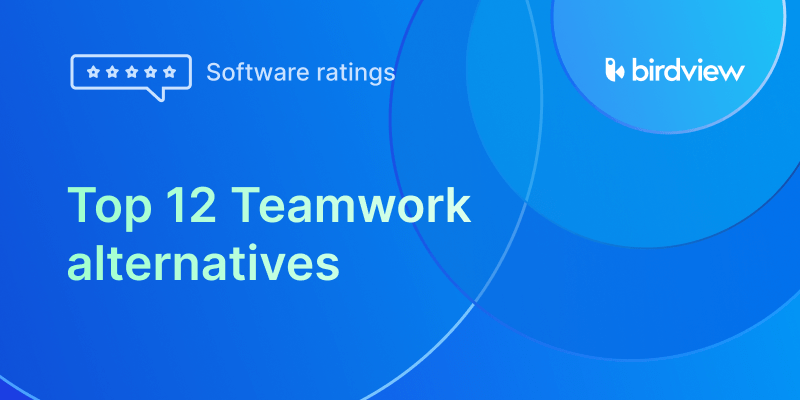Initiating a project with a meticulously planned kickoff meeting can serve as the foundational stone for the project’s triumph. It ensures that all team members embark with a unified vision, grasping fully the objectives, scope, and intended direction of the project. This meeting acts as the essential momentum for shifting from the planning stage to the active phase of execution. This manual is designed to guide you through the key components of a kickoff meeting that is potent in setting the stage for the project’s eventual success.
What is a project kickoff meeting?
A project kickoff meeting is the first gathering of project team members, stakeholders, and sometimes clients before the official start of the project. During this meeting, you can define the project vision, objectives, and expectations to foster a unified understanding and approach among all participants.
When do you need a project kickoff meeting?
The timing of the kickoff meeting is crucial. It should occur after the project plan has been developed but before the execution phase begins. This timing ensures that all project members are aligned with the project’s strategy and objectives and equipped with the necessary information to start work.
4 types of project kickoff meetings
Kickoff meetings come in various formats, each designed to cater to the unique needs of the project and its stakeholders. From internal team alignments to engaging with executive sponsors or clients, understanding the different types of project kickoff meetings can help in planning and executing a meeting that lays a strong foundation for the project.
Internal team kickoff
The internal team kickoff meeting is all about getting the project team on the same page. It’s crucial to ensure that all internal stakeholders, from developers to designers and project managers, understand the project goals, timelines, and their individual roles.
This type of meeting dives deep into project specifics, such as timelines, deliverables, and the detailed project plan. It‘s an opportunity for team members to ask questions, raise concerns, and discuss technical requirements or challenges that might impact the project.
Example: In the healthcare technology sector, a project to develop a new patient management system might involve an internal kickoff. The team would discuss the system’s functionalities, compliance requirements, user experience goals, and integration with existing healthcare databases and systems.
Client engagement kickoff
Client engagement kickoffs are external meetings with the client or customer to align expectations, milestones, and communication protocols. This type of meeting ensures that both the service provider and the client have a mutual understanding of the project’s scope, deliverables, and success metrics.
The agenda often includes a detailed review of the project scope, timelines, key deliverables, and the criteria for success. It‘s also an opportunity to establish a communication plan, including frequency of updates, points of contact, and escalation paths.
Example: In the digital marketing industry, a client engagement kickoff for an online branding campaign might outline the campaign’s objectives, target demographics, key performance indicators (KPIs), content strategy, and timelines. It would also detail the collaboration tools to be used for project management and reporting.
Agile project kickoff
Agile project kickoff meetings are designed for teams that follow Agile methodologies, focusing on setting the stage for iterative development, sprint planning, and continuous feedback. This type of meeting is essential for establishing the Agile framework, sprint durations, roles, and the product backlog.
Discussions in an Agile kickoff often revolve around the Agile principles to be followed, defining the product backlog, setting sprint goals, and clarifying the roles of the Scrum Master, Product Owner, and team members. It‘s also a time to agree on the cadence of sprints, reviews, and retrospectives.
Example: A software company working on a new mobile application would use the Agile kickoff to map out the initial product backlog, define the sprint zero activities (such as setting up development environments or conducting initial user research), and plan the first few sprints, focusing on delivering a minimum viable product (MVP) for early feedback.
Executive sponsor kickoff
Executive sponsor kickoffs aim to secure the buy-in and support from high-level stakeholders within the organization. This meeting focuses on the project’s alignment with broader company goals and its potential impact on the organization’s strategic objectives.
The key here is to articulate the project‘s strategic value, anticipated ROI, and how it supports the organization‘s long-term goals. It‘s also a platform for addressing executive-level concerns and securing necessary resources or budget approvals.
Example: For a manufacturing company launching a new product line, this project kickoff meeting would involve presenting the market research, expected market penetration, production costs, and projected revenues to the executive team, demonstrating how the new product aligns with the company’s growth strategy.
How do you organize a project kickoff meeting: key preparation stages
An effective project kickoff meeting can significantly influence the trajectory and success of a project. It lays the groundwork for clear communication, establishes expectations, and builds a foundation of trust and collaboration among team members and stakeholders. To ensure your kickoff meeting is productive and sets the right tone for the project, follow these detailed steps in your preparation.
- Define the meeting’s objective
Start by figuring out what you want to get out of the meeting. Explain why you have the kickoff in the first place. For instance, it could be to get everyone to meet each other, including the project team and stakeholders, or to go over what the project is about, what we’re trying to achieve, and how long we think it will take. A well-defined objective ensures that the meeting remains focused and provides clear direction for the discussions that will take place. Consider the key outcomes you want from the meeting and how they align with the project’s overall objectives.
- Prepare the agenda
A detailed agenda acts as the roadmap for your project kickoff meeting. It should outline all the key points you plan to cover, including the project’s vision, objectives, scope, the roles and responsibilities of team members, and the communication protocols that will be used throughout the project. When developing the agenda, allocate enough time for each section and ensure there’s a logical flow from one topic to the next. This is also the time to decide if any specific segments require interactive activities or breakout discussions to facilitate deeper engagement. Share the agenda with all participants ahead of the meeting to give them an overview of what to expect and to prepare any questions or inputs they may have.
- Select key participants
The success of a kickoff meeting often hinges on having the right people in the room. This includes essential project team members, key stakeholders, executives, and, in some cases, clients. Consider who has a stake in the project’s success and who can contribute valuable insights or resources. It’s also important to include individuals who will play a critical role in the project execution to ensure they are aligned with the project’s goals from the start. Be strategic in your selection to keep the meeting manageable and focused, avoiding too large a group that could hinder productive discussion.
- Gather and distribute pre-reading materials
To maximize the efficiency of the kickoff meeting, provide participants with relevant project documents and pre-reading materials ahead of time. Before the meeting, collect all pertinent project documents that will support your agenda. This could include the project plan, any background information on the project’s context, research findings, and any other resources that will help attendees prepare for the discussions. By giving participants the chance to review these materials in advance, you ensure that everyone comes to the meeting with a baseline understanding of the project, which can lead to more informed and constructive discussions.
- Plan for engagement
Design your project kickoff meeting in a way that encourages interaction and participation from all attendees. This means planning for more than just presentations and allowing time for questions, discussions, and even brainstorming sessions, if applicable. Consider incorporating activities that break the ice among participants, especially if many of them are meeting for the first time, and use techniques that facilitate open dialogue, such as roundtable discussions or collaborative workshops. The goal is to make everyone feel involved and invested in the project from day one.
- Technical setup and rehearsal
In today‘s digital age, kickoff meetings often utilize video conferencing tools and project management software. Ensure that all technical aspects, such as video links, presentation setups, and access to collaborative tools, are tested and functioning. Conduct a rehearsal to anticipate any potential issues and address them beforehand. This step is crucial for virtual or hybrid meetings to avoid technical difficulties that could disrupt the meeting flow.
- Establish a follow-up plan
Decide how you will capture and distribute meeting notes, decisions, and action items. Determine who will be responsible for sending out the meeting summary and how feedback will be collected post-meeting. This ensures that the momentum generated during the kickoff is not lost and that all participants are clear on their next steps and responsibilities.
- Prepare a risk management overview
While a detailed risk analysis might not fit within the kickoff meeting itself, preparing a high-level overview of potential risks and mitigation strategies can set a proactive tone. This shows the team and stakeholders that risk management is a priority and encourages an open dialogue about potential challenges from the outset.
What is a project kickoff meeting checklist?
A kickoff meeting checklist is an essential tool designed to ensure that your project begins on the right foot, encompassing all the critical elements necessary for a successful start. This checklist serves as a roadmap, guiding the project team through the initial phases of project planning and execution. It helps in aligning the team’s understanding of project goals, timelines, roles, and responsibilities, ensuring everyone is on the same page from day one.
Check out an example of a project kickoff meeting checklist. This checklist can be tailored to fit the specific needs and complexities of your project.
1. Meeting Preparation:
- Schedule the kickoff meeting and send invitations well in advance.
- Prepare and distribute the meeting agenda to all participants.
- Gather all necessary project documentation and resources for reference.
2. Introductions:
- Welcome participants and introduce the project team.
- Briefly describe the project’s background and importance.
3. Project Overview:
- Present the project scope and objectives.
- Review the project timeline and major milestones.
- Discuss the project budget and resources available.
4. Roles and Responsibilities:
- Define the roles and responsibilities of project team members.
- Introduce key stakeholders and their involvement in the project.
5. Communication Plan:
- Outline the communication strategy, including frequency, methods, and tools to be used.
- Establish points of contact for different aspects of the project.
6. Risk Management:
- Identify potential risks and discuss mitigation strategies.
- Assign responsibilities for monitoring and managing risks.
7. Q&A Session:
- Open the floor for questions, clarifications, and suggestions from the team.
- Address any concerns related to the project or the kickoff process.
8. Closure:
- Outline immediate next steps and assign tasks.
- Schedule the next project meeting or check-in.
- Summarize key points discussed and decisions made.
What tools can improve your project kickoff meeting?
To ensure the preparation and successful conducting of a project kickoff meeting, leveraging the right tools can make a significant difference. Here are some tools that can assist in various stages of your kickoff meeting, from planning to execution:
Project management platforms
These platforms offer comprehensive features for planning, executing, and tracking projects. With features such as task assignments, timelines, document sharing, and progress tracking, they offer an integrated environment where project kickoff meetings can be meticulously planned and outcomes monitored.
Birdview is a good example of a comprehensive project management platform designed to streamline project planning and facilitate effective communication within teams. Using Birdview, we will show how your kickoff meeting presentation can be enhanced with comprehensive, impressive data collected with the help of project management software.
Demonstrate project deployment and structure visualization
Demonstrate a detailed overview of the project’s structure, milestones, and tasks at the onset of a project. Birdview enables the presentation of a visual representation of the entire project through Gantt charts or Kanban boards. This visualization facilitates a comprehensive discussion, aiding in understanding the project’s lifecycle, key deliverables, and deadlines during the kickoff meeting.
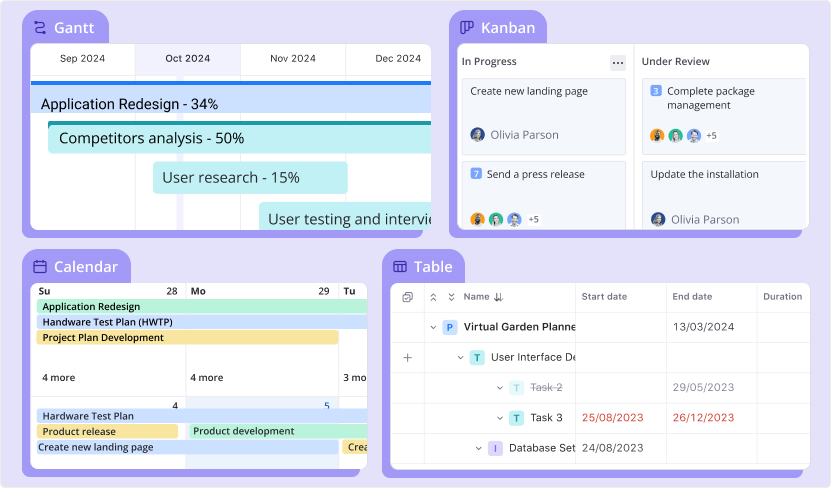
Illustrate resource allocation and dashboard analytics
Illustrate dashboard analytics with project management tools that show resource loading, pinpointing areas of overload and underload. Highlighting these analytics during the kickoff meeting enables informed decision-making regarding resource distribution and prioritization. It ensures a balanced workload among team members, preventing burnout and optimizing productivity.
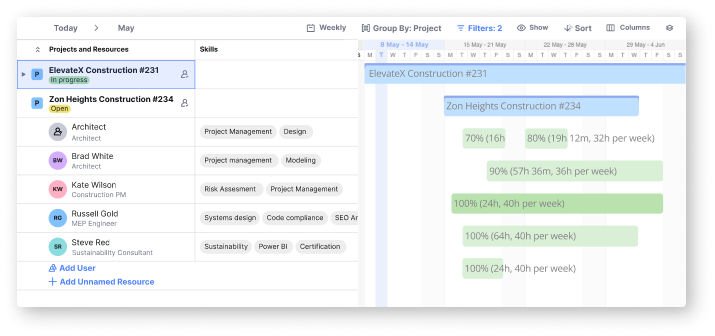
Generate reporting and forecasting
Generate reports that showcase the performance of previous projects and predict future trends based on current data. Incorporating this data into the kickoff meeting provides valuable insights into potential challenges and opportunities. This foresight allows for better strategic planning and adjustment of project parameters as needed.
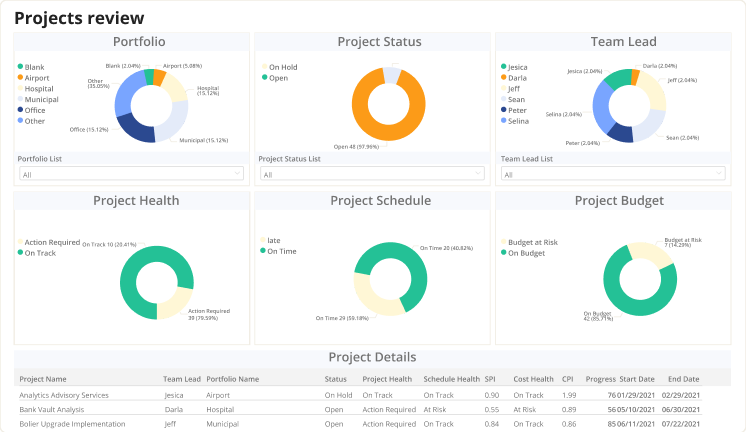
Discuss financial and accounting integration
Discuss financial and accounting reports and tools included in Birdview that detail the project’s budget, cost estimations, and potential profitability or risk factors. Discussing these financial aspects during the kickoff meeting sets realistic expectations and aligns the project with the organization‘s financial goals. It ensures that the project is not only viable but also contributes positively to the bottom line.
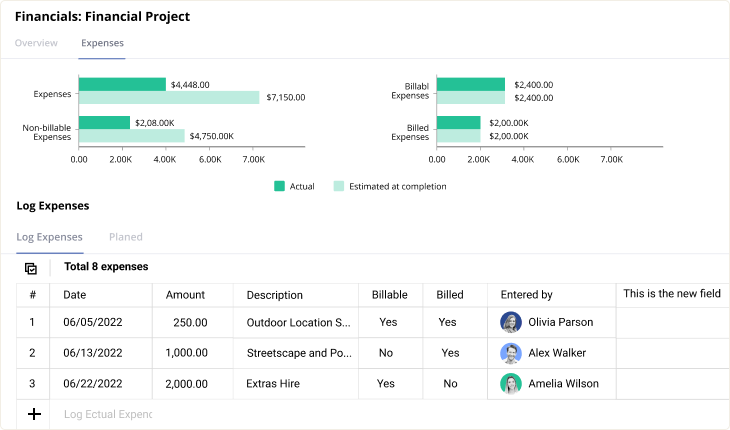
Video conferencing software
Essential for remote or hybrid teams, this software facilitates face-to-face interaction, ensuring that all participants can engage in the kickoff meeting, regardless of their physical location. For example, Zoom stands out for its reliable performance and capacity to host large meetings. Microsoft Teams integrates seamlessly with Office 365 for a unified work environment, and Google Meet provides straightforward access and is well integrated with Google Workspace, facilitating ease of use.
Collaborative whiteboards
These tools allow teams to brainstorm, visualize ideas, and plan projects in a dynamic, interactive environment, making them perfect for engaging and creative kickoff sessions. Miro offers a comprehensive set of tools for extensive planning and brainstorming sessions, while Jamboard is a simpler alternative that integrates well with Google Workspace for collaborative sketching and note-taking.
Communication platforms
Keeping the team connected before, during, and after the kickoff meeting is crucial. These platforms provide a space for ongoing discussions, updates, and clarifications. Slack is renowned for its efficient channel-based communication and robust integration capabilities with numerous other productivity tools. You can also try out Discord, which provides flexible voice and text communication options, making it suitable for both real-time discussions and asynchronous updates.
Document sharing and collaboration tools
For distributing pre-reading materials, sharing agendas, and collaboratively taking notes during the meeting, these tools ensure that all participants have access to essential information and can contribute in real time. You can use Google Docs for seamless real-time document collaboration and editing and Microsoft OneDrive, which offers comprehensive file-sharing options within the Office suite.
Choosing the right combination of these tools, based on your project’s specific needs and the preferences of your team, can significantly enhance the effectiveness of your project kickoff meeting, setting a solid foundation for the project’s success.
Final thoughts
The journey of every successful project begins with a well-structured and strategically planned kickoff meeting. The essence of these meetings lies in their ability to foster a unified understanding and approach among all participants and ensure everyone involved is equipped with the necessary information to begin their work. By investing time in preparing for and conducting an effective project kickoff meeting, you’re not just planning for success; you’re actively taking the first step toward achieving it.
Throughout this guide, we’ve showcased examples and screenshots using Birdview, illustrating how this software, among others, can be instrumental in preparing for your project kick-off meeting. To experience its full potential firsthand, create your Birdview account now! Sign up for our 14-day free trial, which can be extended up to 28 days.






